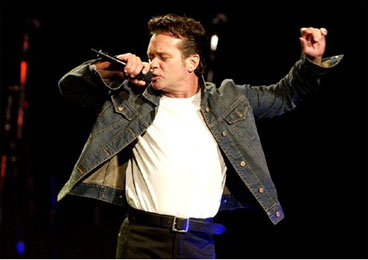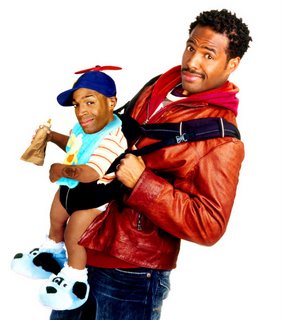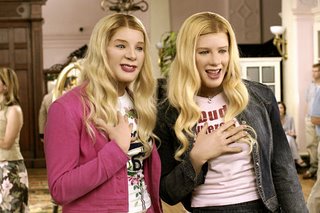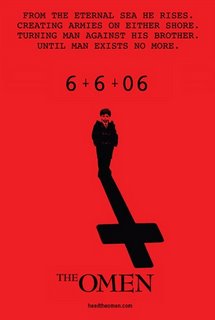 So there's been a lot on my mind recently. First there were GREs and LSATs, then there's still work and life and the living of it. And of course there are the eternal existential ponderings, the endless agonizing and ruminating upon the meaning(s) of the last six words of that last sentence. Wrapped up in the midst of all that monkeystuff, I was out of sorts for a pretty minute here a few weeks ago. Just scatterbrained and spentshot. Allow me to offer two brief short tastes with a common theme:
So there's been a lot on my mind recently. First there were GREs and LSATs, then there's still work and life and the living of it. And of course there are the eternal existential ponderings, the endless agonizing and ruminating upon the meaning(s) of the last six words of that last sentence. Wrapped up in the midst of all that monkeystuff, I was out of sorts for a pretty minute here a few weeks ago. Just scatterbrained and spentshot. Allow me to offer two brief short tastes with a common theme:I'm walking to the T on a Monday afternoon, I've worked doubles all weekend and I'm just turning around back to Cambridge after a long night morning afternoon of studying and listening to whatever my iTunes puts to shuffle. There's a switchbacked trail of Tom Waits and Miles Davis and Townes Van Zandt and The Roots and Morphine and Nina Simone and Belle and Sebastian and U2 and even a gentle dressing of Pearl's Jam glazing my brain, and I'm walking without my legs, just a head bobbing atop feet loosely connected to the rest of my body, the hinges that bend doing most of their work simply not breaking their flex parameters and buckling beneath the flaccid heap of my shuffling frame. I get to Savin Hill and sit down at the end of the platform and pull out Cormac McCarthy's The Crossing, which is totally blowing the leftover fragments of my mind still receptive to creative expression. The train pulls in and I get aboard with my index finger holding my place and I sit down and stuff my backpack between my feet because I know--empty as the car is now--I don't want to be taken away from this book when somebody asks me to move my sack from the seat next-to. So I'm sitting there and reading up close (as such works demand) when I notice my fly is down. Even through the boxer briefs I prefer (the freedom of the former with the slim lines of the latter) I can feel the canned air of the train as it makes its way through the opening in my pants, but at this point I've passed a stop or two and there's nothing to be done without announcing to all, "I AM ONE OF THOSE PEOPLE YOU MEET ON PUBLIC TRANSPORTATION WHO HALF-CHEWS AND SPITS APPLE BITS HALFWAY DOWN THE CAR WHILE RATTLING ON TO NOBODY IN SOME STRANGE PIDGIN, OR WHO FARTS LOUDLY AND REPEATEDLY ON THE PLATFORM WHILE TALKING IRRITATEDLY TO HIS WIFE IN THE FISHING CAP WHILE SHE ROCKS WITH HER SHOPPING BAG AND PRETENDS NOT TO NOTICE, OR WHO WALKS INTO THE CAR PAINTED SILVER FROM NOSE TO CHIN AND OFFERS THE WELL-DRESSED WOMAN ACROSS FROM HIM A FIVE-TIMES-FOLDED DOLLAR FOR LISTENING TO HIS RANT ABOUT HOW EDUCATION IS WHAT WE NEED TO SAVE THE GOVERNMENT FROM THE PEOPLE. OH, AND MY FLY IS UNDONE, WHICH MAY OR MAY NOT BE INTENTIONAL AND MAY OR MAY NOT BE EVIDENCE THAT I, MYSELF, AM UNDONE IN MORE THAN THE USUAL WAY. AND THOSE GLOSSY STAINS ON MY WEEKEND-OLD PANTS ARE EITHER SEMEN OR YOGURT. YOU BE THE JUDGE, SINCE YOU WERE HEADING THAT DIRECTION ANYWAY."
I could just give an Excuse Me Smile while I zip up, just another guy on the train who's gotten there without thinking how or in what state of (un)dress, one more Joe on the way to his Average Eking-Out with Other Shit on his mind. But no, I don't. I put the book in one hand, a three-finger split, and with the other I pull my shirttail a little further down from out my zipped jacket, then the jacket down another inch or so until I'm pretty sure I'm covered between the coverage from above (shirt and jacket) and below (open book on lap). And it's about this time that I realize the adjustments I'm making to assuage the suppositions of my trainmates are exactly the kind of adjustments any of my trainmates would expect from someone with lassi spots on his shins and a shifty look in his eye who wanted to keep his fly open without raising too much untoward attention. At that point I give up entirely and just start reading distractedly while counting the stops to Harvard Square, at which point I walk out of the train with backpack in front while surreptitiously zipping with two fingers holding the pull and a pinky anchoring the bottom of the zipper.
 So this entire experience wouldn't have stuck with me, nor would it have merited an in-depth explanation, were it not for my time in the security line at Logan International three days later. It's five in the morning and the woman helming the other queue is barking like a Jamaican fishmonger to everyone in the five or six lines not even under her auspices. "Take off dem shoes, chil', and ya belt, sah, and place dat bag flat on de belt, missus..." ad infinitum. Taken as I am by this woman's incessant incantations, I'm unconscious going through the line. I hear her addressing holiday travelers a full thirty feet away, personally and with an authority that only seems to grow with distance. With little more than a "missus" or a "sah," she manages to get the head she intends to turn, to turn. So I'm watching this display and doing what she asks, so as not to draw her attention away from the other, more interesting complaints and requests and suggestions she has rolling out towards the other sheep in the lines. Shoes in my hands, socks sweeping the floor cleaner than it has been swept by the thousands herded in front of me, yet less clean than it will be after those behind me, I unbuckle my belt because it has been recommended by both five years of post-9/11 air travel and the bewitching voice of the woman orchestrating miles of post-9/11 air travelers everyday. But maybe because it's so early or maybe because I've been on autopilot for such a stupefying period of time--and only half disregarding the two hours of sleep I managed to squeeze from the night before--I don't stop there. Before I catch myself from my reverie and sound a reveille I've got my whole pants situation undone and almost below-mast. Around the time I realize this I'm thinking shitshitshit they're gonna corral me in that purgatory past the screeners and the metal detectors and the woman with the voodoo voice and there won't even be any magazines and they'll hold me and search me and wand me and flag me for the no-fly and I might as well have taken up Islam or that whole Sikh thing in college like everyone else 'cause then I'd be able to righteously and rightfully bitch about unfair treatment and cultural biases and maybe by now I'd at least have hair long enough for a turban or one of those gingham-lookin' hats Arafat used to wear even though I can't grow a full beard and I'd never blow myself up for anything but I'd gladly blow up the spot in a second if only I could rhyme or play the guitar and maybe even then they'd get me at security for the long fingernails I'd grown to play those ol' Spanish tunes I like for the loops 'cause now you can't even carry on a nailfile or a pack of Chewels for the gelly centers, even if they hadn't been discontinued in '91.
So this entire experience wouldn't have stuck with me, nor would it have merited an in-depth explanation, were it not for my time in the security line at Logan International three days later. It's five in the morning and the woman helming the other queue is barking like a Jamaican fishmonger to everyone in the five or six lines not even under her auspices. "Take off dem shoes, chil', and ya belt, sah, and place dat bag flat on de belt, missus..." ad infinitum. Taken as I am by this woman's incessant incantations, I'm unconscious going through the line. I hear her addressing holiday travelers a full thirty feet away, personally and with an authority that only seems to grow with distance. With little more than a "missus" or a "sah," she manages to get the head she intends to turn, to turn. So I'm watching this display and doing what she asks, so as not to draw her attention away from the other, more interesting complaints and requests and suggestions she has rolling out towards the other sheep in the lines. Shoes in my hands, socks sweeping the floor cleaner than it has been swept by the thousands herded in front of me, yet less clean than it will be after those behind me, I unbuckle my belt because it has been recommended by both five years of post-9/11 air travel and the bewitching voice of the woman orchestrating miles of post-9/11 air travelers everyday. But maybe because it's so early or maybe because I've been on autopilot for such a stupefying period of time--and only half disregarding the two hours of sleep I managed to squeeze from the night before--I don't stop there. Before I catch myself from my reverie and sound a reveille I've got my whole pants situation undone and almost below-mast. Around the time I realize this I'm thinking shitshitshit they're gonna corral me in that purgatory past the screeners and the metal detectors and the woman with the voodoo voice and there won't even be any magazines and they'll hold me and search me and wand me and flag me for the no-fly and I might as well have taken up Islam or that whole Sikh thing in college like everyone else 'cause then I'd be able to righteously and rightfully bitch about unfair treatment and cultural biases and maybe by now I'd at least have hair long enough for a turban or one of those gingham-lookin' hats Arafat used to wear even though I can't grow a full beard and I'd never blow myself up for anything but I'd gladly blow up the spot in a second if only I could rhyme or play the guitar and maybe even then they'd get me at security for the long fingernails I'd grown to play those ol' Spanish tunes I like for the loops 'cause now you can't even carry on a nailfile or a pack of Chewels for the gelly centers, even if they hadn't been discontinued in '91.Around such time I pull myself out of that deep divot of anxiety and hike up my pants and I suddenly couldn't give two shits if the TSA flunkies or my fellow herdees might have witnessed my absentmindedness 'cause goddammit I'm innocent. Like Adam, so am me--though given another minute or two I'd likely have been just as frisky-ass naked as Original Sin and looking for the nearest hot apple pie. No figgy leaf or nothin', just a pantsed white boy wondering where along that windy road behind he'd left his presence of mind. And his drawers.






















